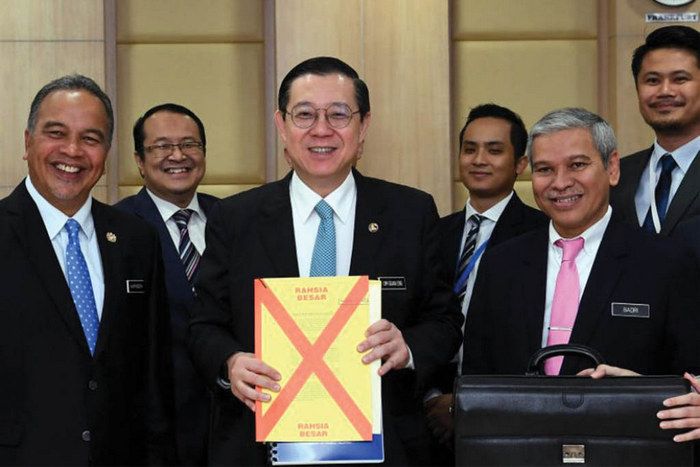Editorial: Too Few Taxpayers


By Fathol Zaman Bukhari
The new Pakatan Harapan Government tabled Budget 2020 on Friday, October 11. It took Finance Minister Lim Guan Eng over two hours to cover every aspect of the proposed national budget for the Year 2020. In retrospect, the fiscal outlook and revenue estimates are nothing to shout about, especially income derived from taxes
Here are some glaring facts and figures. Out of the 1.25 million companies doing business in the country, only 780,742 (62.4 per cent) are registered with the Inland Revenue Board. Out of this, a minuscule 61,000 (7.8 per cent) paid taxes at end-2017. Personal income tax is more encouraging.
However, out of the nation’s workforce of 15 million only 2.5 million (16.5 per cent) are paying taxes. A large number of individuals and companies do not pay taxes. The numbers, according to a recent study, is growing. The trend is not healthy for the country that is heavily dependent on oil and gas to prop up its economy.
Within South-East Asia, the country with the lowest ratio of tax collected, vis-à-vis Gross Domestic Product, is Indonesia. Revenue from taxation amounts to only 3.4 per cent of the country’s total domestic output.
The reason why many Malaysian companies and individuals do not pay taxes is because of the generous incentives and reliefs that allow them to minimise paying taxes entirely. This “playing to the gallery” is being practised by all countries in the world. After all which government wants to be unpopular in the eyes of the masses.
The other major impediment is the size of the country’s informal economy, which encourages leakages within the system.
In Indonesia, the informal economy is very huge and that explains why the tax base is low. It is mainly linked to the agriculture sector where incomes are unpredictable. This explains the high level of poverty and unemployment in that country. Over in Malaysia, it has to do with those conducting “behind the scene businesses” like hawkers, night-market operators, direct-selling and, perhaps, drug-peddling. These itinerant traders do not pay any form of taxes.
The emergence of technology-driven companies like Go-Jek has improved the livelihood of many Indonesians. Go-Jek’s transfer services attract 20 million users per month. Unfortunately, service providers are not taxed.
When Grab founder, Anthony Tan, sought a start-up capital for his e-hailing cab business our local financiers and bureaucrats pooh-poohed the idea and Singapore benefitted. Anthony Tan’s net worth today is almost RM400 million. He is among the 50 richest people in Malaysia. Our ignorance and stupidity have caused us to lose out to our southern neighbour and this includes street food which we took pride in.
The informal economy in Malaysia is expanding. Plugging the leakage is imperative if the lopsided tax system is to be corrected. The government’s Tax Reform Committee is considering imposing services tax on offshore companies providing digital services.
The committee opines that the prevalent incentives and reliefs need a review as they are being abused by the unscrupulous resulting in revenue losses that can help overcome our financial shortcomings. Therefore, there is a need to review the Promotion of Investments Act and the Income Tax Act for relevance and effectiveness.
The PH government needs a more efficient tax system, as savings on excesses left by the previous BN government are now almost exhausted. It needs to increase revenue from operations to meet its fiscal deficit target of below 3 per cent by 2022. It has already missed the deficit target of 3 per cent for 2020.
Oil revenue is not expected to grow beyond 20 per cent of total federal government revenue in the next few years. This is based on the assumption that oil price would cap at around USD 60 to USD 65 per barrel between 2020 and 2022. For the year 2020, the budget is based on USD 62 per barrel, which is a much more realistic compared to USD 70 per barrel that the government had envisaged for Budget 2019.
With no major boost from oil revenue, the government is looking at increasing revenue from the Sales and Service Tax (SST) for next year, where it expects to collect RM28.3 billion compared to RM26.8 billion this year. Those who thought that the government was going to lose big time as a result of scuttling the Goods and Services Tax (GST), they will be proven wrong.
Tun Mahathir had said that the government would not reintroduce GST, as it expects to collect more from the SST over the years. The prime minister is not entirely wrong. The SST replaced the GST after the change in government in May 2018. The full-year collection of the SST kicked off this year, where the government expects to collect RM26.8 billion. Next year, the amount to be collected is targeted at RM28.3 billion.
Under the GST regime, the total amount collected between 2015 and April 2018 was about RM131 billion. However, unpaid refunds amounted to RM19.4 billion. If the refunds are taken into consideration, the net amount that the government gets is less than RM30 billion per annum. It is more or less the same as the amount collected from SST.
Some economists are of the opinion that the GST should be re-introduced, but at a lower rate, and that the government should ensure speedy processing of claims for refunds. The GST, they say, is a fairer tax system as it is a consumption-based tax. On paper, it sounds logical. Politically, however, it is suicidal for Pakatan Harapan to revert to GST so soon after assuming power.
The more pressing matter at hand is how to boost a stagnating economy. The Consumer Price Index increase for Perak in September is 1.2 per cent, a fraction above the national average of 1.1 per cent. This is one significant advantage of no GST – it keeps inflationary tendency in check. Prices of goods and services tend to remain stable.
The tax system needs a review because the present set of incentives, reliefs and laws are not effective in plugging leakages and attracting investments. We definitely need is a sure-proof system that can plug the many leaks and loopholes that fraught our tax regime.


